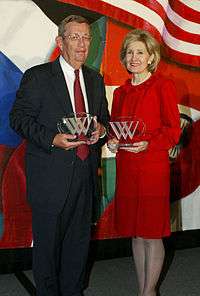Lee Raymond
| Lee Raymond | |
|---|---|
|
Raymond on the left of Kay Bailey Hutchison, both won Woodrow Wilson Awards | |
| Born |
August 13, 1938 Watertown, South Dakota, US |
| Nationality | American |
| Alma mater |
University of Wisconsin–Madison University of Minnesota. |
| Occupation | former Chairman & CEO, Exxon Mobil |
| Political party | Republican |
| Spouse(s) | Charlene |
| Children | 3[1] |
Lee R. Raymond (born August 13, 1938) is an American businessman, and the chief executive officer (CEO) and chairman of ExxonMobil from 1999 to 2005. He had previously been the CEO of Exxon since 1993. He joined the company in 1963 and has been president since 1987, and a director since 1984.
Early life and education
Lee Raymond was born in Watertown, South Dakota on August 13, 1938. He graduated from Watertown High School in 1956. Raymond received a bachelor's degree in chemical engineering from the University of Wisconsin–Madison in 1960. Raymond went on to earn his PhD in Chemical Engineering from the University of Minnesota. He was awarded an honorary doctorate from the same university in 2001. Raymond met his wife while studying at the University of Wisconsin–Madison; she was pursuing, and later earned a degree in journalism.
Career
Raymond began working for ExxonMobil in 1963. Raymond became a director of ExxonMobil in 1984 and in 1987 he became the President of the company. In 1993, he became CEO, a post he held until 2005. On August 14, 2005, Raymond announced that he would retire at the end of 2005 as ExxonMobil's Chairman and CEO. ExxonMobil president Rex W. Tillerson succeeded Raymond on 1 January 2006. On April 14, 2006, it was reported that Raymond's retirement package was worth about $400 million, the largest in history for a U.S. public company.[2] However, the majority of that sum consisted of retirement-independent salary, bonuses, stock options, and restricted stock awards from his final year and prior years that, while high, are not unprecedented among major American CEOs. Retirement-specific payments in accordance with the standard pension plan provided to all ExxonMobil employees totaled around $100 million, calculated based on his over forty years of service and his salary upon retirement. Raymond was also chair of the National Petroleum Council (NPC), when it was asked to produce a report on the future of oil supply and demand.[3] Raymond was one of the most outspoken executives in the United States against regulation to curtail global warming.[4]
Legacy
Lee Raymond was at the helm of Exxon while it remained of the last large companies to not include gay employees in their anti-discrimination policy. He was also at the helm during the takeover of Mobil, when the new Exxon-Mobil corporation rescinded Mobil's pre-existing anti-discrimination policy.[5] HR policy was eventually updated in 2015 to include a prohibition on discrimination against gay employees, but from 1999-2014 the board annually rejected a resolution brought by shareholders to compel the company to implement a non-discrimination policy.[6]
Raymond was also one of the few Fortune 500 CEOs to publicly speak against the Kyoto Protocol. He questioned the science behind global warming, and warned that regulations would be ineffective.
His son, John T. Raymond, is active in the oil and gas industry. John partnered with the Jim Flores and Paul Allen-backed Vulcan Capital in the buyout of Plains Resources.[7]
Lee Raymond received the Woodrow Wilson Award from the Woodrow Wilson International Center for Scholars of the Smithsonian Institution for Corporate Citizenship during a dinner held in his honor in Dallas, Texas in early 2003.
References
- ↑ "Lee R. Raymond". Reference For Business. Retrieved August 14, 2015.
- ↑ "Kamala Harris grew up idolizing lawyers". ABC News. April 14, 2006.
- ↑ David J. Lynch (November 24, 2005). "Can oil production satisfy rising demand?". USA Today.
- ↑ Thaddeus Herrick (August 29, 2001). "Exxon CEO Lee Raymond's Stance On Global Warming Causes a Stir". The Wall Street Journal.
- ↑ James B. Stewart (July 1, 2015). "Exxon Lumbers Along to Catch Up With Gay Rights". The New York Times.
- ↑ Wright, John. "ExxonMobil shareholders vote down LGBT protections". Retrieved 26 February 2016.
- ↑ http://www.petroleumnews.com/pnnew/363756239.html Petroleum News
External links
Articles by Lee Raymond
- Article: World Energy Magazine - The Future of Energy in Emerging Asia
- Article: World Energy Magazine - The United Kingdom Leads Europe’s Growing Import Demand
Other
- SEC-filed Proxy Statement detailing Raymond's retirement compensation, SEC (US Securities and Exchange Commission)
- Enemy of the Planet New York Times piece by Paul Krugman, 17 April 2006
- Scientists offered cash to dispute climate study Guardian article by Ian Sample, 2 February 2007
| Business positions | ||
|---|---|---|
| Preceded by position created |
CEO of ExxonMobil November 30, 1999–December 31, 2005 |
Succeeded by Rex Tillerson |
| Preceded by Lawrence G. Rawl |
CEO of Exxon 1993–November 30, 1999 |
Succeeded by Continued as head of ExxonMobil |
